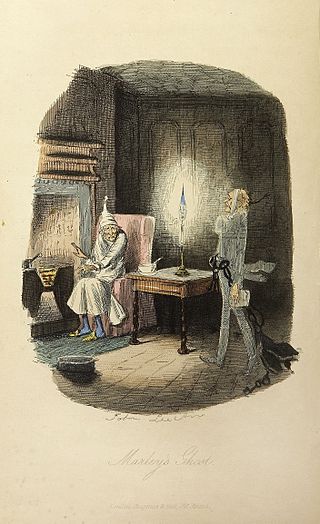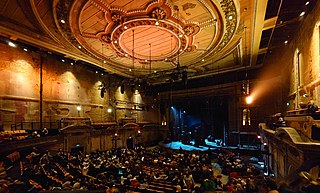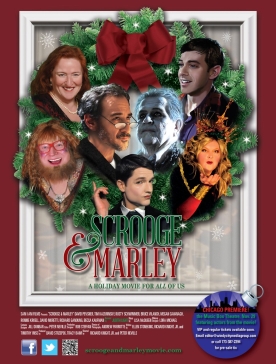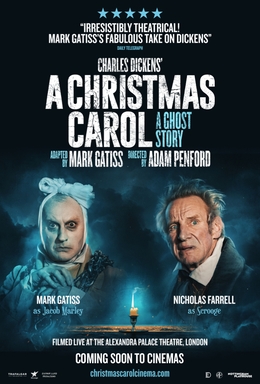Related Research Articles

A Christmas Carol. In Prose. Being a Ghost Story of Christmas, commonly known as A Christmas Carol, is a novella by Charles Dickens, first published in London by Chapman & Hall in 1843 and illustrated by John Leech. A Christmas Carol recounts the story of Ebenezer Scrooge, an elderly miser who is visited by the ghost of his former business partner Jacob Marley and the spirits of Christmas Past, Present and Yet to Come. After their visits, Scrooge is transformed into a kinder, gentler man.

Ebenezer Scrooge is the protagonist of Charles Dickens's 1843 novella A Christmas Carol. At the beginning of the novella, Scrooge is a cold-hearted miser who despises Christmas. The tale of his redemption by three spirits has become a defining tale of the Christmas holiday in the English-speaking world.

A Christmas Carol is a 1938 American drama film adaptation of Charles Dickens's 1843 novella of the same name, starring Reginald Owen as Ebenezer Scrooge, an elderly miser who learns the error of his ways on Christmas Eve after visitations by three spirits.

Jacob Marley is a fictional character in Charles Dickens's 1843 novella A Christmas Carol, a former business partner of the miser Ebenezer Scrooge, who has been dead for seven years.

A Christmas Carol is a British-American animated adaptation of Charles Dickens's 1843 novella. The film was broadcast on U.S. television by ABC on December 21, 1971, and released theatrically soon after. In 1972, it won the Academy Award for Best Animated Short Film.

The Ghost of Christmas Past is a fictional character in Charles Dickens' 1843 novella A Christmas Carol. The Ghost is one of three spirits which appear to miser Ebenezer Scrooge to offer him a chance of redemption.

The Ghost of Christmas Present is a fictional character in Charles Dickens' 1843 novella A Christmas Carol. The Ghost is one of three spirits which appear to miser Ebenezer Scrooge to offer him a chance of redemption.

The Ghost of Christmas Yet to Come is a fictional character in Charles Dickens's 1843 novella A Christmas Carol. The Ghost is one of three spirits which appear to miser Ebenezer Scrooge to offer him a chance of redemption.
A Christmas Carol is a 1908 silent film produced by Essanay Studios in Chicago, and the first American film adaptation of Charles Dickens' famous 1843 novella of the same name. Tom Ricketts stars as Ebenezer Scrooge in the film, which is considered lost.

A Christmas Carol, the popular 1843 novella by Charles Dickens (1812–1870), is one of the English author's best-known works. It is the story of Ebenezer Scrooge, a greedy miser who hates Christmas, but is transformed into a caring, kindly person through the visitations of four ghosts. The classic work has been dramatised and adapted countless times for virtually every medium and performance genre, and new versions appear regularly.

A Flintstones Christmas Carol is a 1994 American animated made-for-television film featuring characters from The Flintstones franchise, and based on the 1843 novella A Christmas Carol by Charles Dickens. Produced by Hanna-Barbera, it features the voices of Henry Corden, Jean Vander Pyl and Frank Welker. It first aired November 21, 1994 in syndication

The Stingiest Man in Town is a 1978 animated Christmas musical television special based on Charles Dickens' 1843 novella A Christmas Carol. It was created by Arthur Rankin Jr. and Jules Bass, and features traditional animation rather than the stop motion animation most often used by the company. It was an animated remake of a long-unseen, but quite well received, live-action musical special which had starred Basil Rathbone, Martyn Green, and Vic Damone. The live-action version had been telecast on December 23, 1956, on the NBC anthology series The Alcoa Hour, and was published on DVD in 2011, by VAI. The animated remake first aired December 23, 1978, in the United States on NBC, and was telecast in Japan the next day.

A Christmas Carol is a one-man stage performance by English actor Patrick Stewart of the Charles Dickens 1843 novella of the same title, which has been performed in the United Kingdom and the United States on occasion since 1988.
A Christmas Carol is a musical with music by Alan Menken, lyrics by Lynn Ahrens, and book by Mike Ockrent and Lynn Ahrens. The musical is based on Charles Dickens' 1843 novella of the same name. The show was presented annually at New York City's Theater at Madison Square Garden from December 1, 1994, to December 27, 2003.

Scrooge, or, Marley's Ghost is a 1901 British short silent drama film, directed by Walter R. Booth, featuring the miserly Ebenezer Scrooge confronted by Jacob Marley's ghost and given visions of Christmas past, present, and future. It is the earliest film adaptation of Charles Dickens's 1843 novella A Christmas Carol.
Strawberry Theatre Workshop is a Seattle theatre company founded in 2003 by Greg Carter, associated with a movement in that city to improve wages for professional theatre artists. Its name "is derived from the Strawberry Fields of popular music, and the Beatles, who used their recording studio as a daily laboratory of expression."
"A Christmas Carol" is the December 23, 1954 episode of the hour-long American television anthology variety series, Shower of Stars. The episode is an adaptation of Charles Dickens' 1843 novella of the same name.

Scrooge & Marley is 2012 film adaptation of Charles Dickens' 1843 novella A Christmas Carol, which is retold from a gay perspective, co-directed by Richard Knight Jr. and Peter Neville, and co-written by Knight, Ellen Stoneking, and Timothy Imse. It also features David Pevsner as Ebenezer "Ben" Scrooge, Tim Kazurinsky as the ghost of Scrooge's business partner Jacob Marley, Ronnie Kroell as the Ghost of Christmas Past, Megan Cavanagh as the Ghost of Christmas Present, David Moretti as Bob Cratchit, and JoJo Baby as the Ghost of Christmas Future. The film adaptation received a mixed critical reception.

A Christmas Carol: A Ghost Story is a 2021 stage version of the 1843 novella A Christmas Carol by Charles Dickens. Adapted by Mark Gatiss and directed by Adam Penford, the stage drama was originally scheduled to open in 2020 but was delayed owing to the COVID-19 pandemic. It was eventually produced at the Nottingham Playhouse from 29 October to 20 November 2021 with a cast of 15 playing 50 characters and was filmed live for a cinema release during the stage run at the Alexandra Palace in London where it ran from 26 November 2021 to 9 January 2022. It received its cinema release on the 27th November and 1st December 2022 before it was shown on BBC Four on 25 December 2022.

A Christmas Carol; or, Past, Present, and Future is a play in three acts by Edward Stirling at the Adelphi Theatre in London on 5 February 1844. Containing songs especially written for the show, the drama was adapted from the novella A Christmas Carol by Charles Dickens which had been published just weeks before in December 1843. By February 1844 eight other adaptations had already appeared on the London stage, including A Christmas Carol, or, the Miser's Warning! by C. Z. Barnett, which had opened at the Surrey Theatre in February 1844. Stirling's version, however, was the only production to be sanctioned by Dickens, who gave permission for the adaptation in January 1844.
References
- ↑ Charles Dickens, A Christmas Carol (1843)
- ↑ "Gallery". Archived from the original on 21 November 2008. Retrieved 4 May 2010.
- ↑ "Press Release". Archived from the original on 6 January 2009. Retrieved 4 May 2010.
- ↑ Seattle Actor 16 December 2005
- ↑ Seattle Actor, 14 December 2004
- ↑ Seattle Actor 16 December 2005
- ↑ Seattle Times 17 December 2004
- ↑ Seattle Post-Intelligencer 17 December 2005